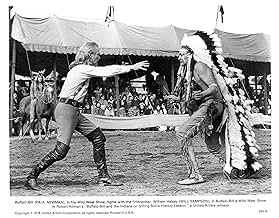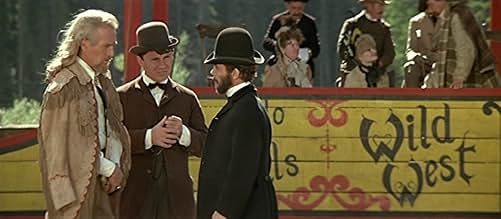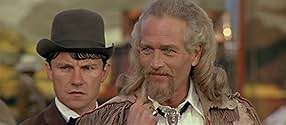Buffalo Bill et les Indiens
- 1976
- Tous publics
- 2h 3m
A cynical Buffalo Bill hires Sitting Bull to exploit him and add his credibility to the distorted view of history presented in his Wild West Show.A cynical Buffalo Bill hires Sitting Bull to exploit him and add his credibility to the distorted view of history presented in his Wild West Show.A cynical Buffalo Bill hires Sitting Bull to exploit him and add his credibility to the distorted view of history presented in his Wild West Show.
- Director
- Writers
- Stars
- Awards
- 1 win total
- Prentiss Ingraham
- (as Allan Nicholls)
- Oswald Dart
- (as Robert Doqui)
- Director
- Writers
- All cast & crew
- Production, box office & more at IMDbPro
Featured reviews
The satire also explores the way Bill runs his show, or the way any CEO might run a company, and whether truth or entertainment is more important to the crowd. The truth Sitting Bull wishes to bring to the people is much less important to Bill than are his ticket sales. The juxtaposition of Sitting Bull's meekness and the way Bill portrays him in the show as a murderous, ruthless warrior is really brilliant.
"Tell Joy not to get on the horse in back," mutters the show's MC, Salisbury (Joel Grey) regarding an actress playing a white woman abducted by Indians. "It looks fake. We're in the authentic business." Later, Salisbury shoots down a band's idea of real frontier music as "too Ukrainian."
All this is easy to miss when so much is going on at once, while horses nearly run down a pedestrian in the foreground. This is a Robert Altman film, after all, or "Robert Altman's Absolutely Unique and Heroic Enterprise of Inimitable Lustre!" as it bills itself.
As Jeff Lebowski might say, Altman's not into that whole brevity thing here. A two-hour extravaganza, "Buffalo Bill" stars Paul Newman as Bill and makes its points about how show business and American mythmaking became one with repetitive, haymaker swings. The end result is a comedy that's not that funny and a social statement that's not that convincing, but Altman's secret sauce of a busy camera and piquant performances makes for a pleasant if shapeless affair.
Newman's something of a disappointment, giving less a performance than a caricature. I get the feeling he was directed by Altman to just play a slightly older and more pompous Hud with a goatee. He fills out Bill by drinking rotgut from a schooner, loving and spurning a succession of opera singers who never stop singing in frame, and watching over his stardom with a kind of prissy defensiveness that belies his self-cultivated frontier image. He can be a joy to watch still, working his eyes and playing to his mirror, maybe winking at the audience about what they expect from him as both Bill and Paul. If only he had better material.
"You ain't changed, Bill."
"I ain't supposed to. That's why people pay to see me."
There's also the business of his dealing with the Wild West Show's newest star attraction, Sitting Bull (Frank Kaquitts), which gives the story much of its social perspective. Bill thinks of Bull as an ungrateful pet who needs cultivation in "the show business," while Bull thinks Bill sells lies in the guise of history. Hence the "history lesson," which feels shoehorned in from a more socially committed source play. Altman wants to tell that story, but most times he'd rather have fun with the show-making part, and while you are watching this, you wish he'd cut loose and do just that.
The film succeeds in short bursts, though the eccentric casting choices Altman throws at you here don't work as well as they did in his other films. Geraldine Chaplin as Annie Oakley? Harvey Keitel as Bill's nerdy nephew? Some Altman vets like Robert DoQui and Allan F. Nicholls are barely in the film while stars like Newman, Keitel, and Burt Lancaster get longer spotlight time. John Considine is fun as Annie's flinchy husband, "the handsomest human target in the West," though that running joke, like so many others, is plugged more times than one of Annie's nickels. I was impressed also by Kevin McCarthy's publicist character, not only for the juiciness of his grandiloquent performance but the magnitude of his handlebar mustache.
"Buffalo Bill" takes a lot of time saying a good deal less than it thinks. But the spectacle of "the show business" and the minor bits of Altman kookiness and sardonic commentary around the edges keep this a diverting if underfilling entertainment.
Then the Indians show up. Sitting Bull and William Halsey are portrayed as noble, mysterious and aloof. The movie spirals into a series of events where they confound the smarmy Bill Cody over and over. The last hour of the movie requires Newman to act more and more flustered by Sitting Bull until he has a really cringeworthy breakdown in front of a ghostly Sitting Bull. Maybe there was more fresh drama in watching a white profiteer abase himself before noble Injuns in 1976. It's hard for me believe that anyone but the most hardcore sentimentalist will find the drama between Cody and Bull interesting.
Anyway, there's stuff for hardcore Altman fans to watch for. Newman is initially impressive in his role and then sputters. The pageants and attention to details that Altman excels at are well done. Ultimately the themes of showbiz and history wilt before the rambling blah of the noble savage.
The two biggest flaws, though, are these: Compared to most of Altman's films, much of the dialogue in this movie is very "stagy" and theatrical. I suppose it's supposed to be that way because of the questions of "myth" and "legend" that the story concerns itself with, but my impression was that such theatrical-sounding dialogue didn't mesh well with Altman's typically naturalistic style of filming.
The other problem I had is that the whole subject matter -- myth vs. reality, history vs. reality, show business vs. reality, etc. -- isn't really explored with any depth or subtlety. We're constantly being reminded that Buffalo Bill is a man who created his own legend out of lies, and that that is the basis of modern show business to this day, but really, that just didn't strike me as being a particularly insightful observation. This is hardly the first movie to point out that lies are often more "real" (or more attractive) than the truth, and Altman doesn't seem to bring anything new to the table.
Still, it's Altman, which means it's well-made, entertaining and beautiful to look at. I don't think this will ever be considered one of his major works but it's certainly worth a look.
Did you know
- TriviaThe full-length portrait of Buffalo Bill astride his horse, that appears several times in the film, is based closely on a similar portrait by the French artist Rosa Bonheur, which hangs in the Buffalo Bill Historical Center in Cody, Wyoming.
- GoofsSitting Bull joined Cody's show in 1885. The performing arena shows several Wyoming state flags, but Wyoming wasn't granted statehood until 1890, and that flag wasn't adopted until 1917.
- Quotes
William F. 'Buffalo Bill' Cody: My daddy was killed tryin' to keep slavery outta Kansas.
Oswald Dart: How'd he do that, sir?
William F. 'Buffalo Bill' Cody: Well, my daddy hated slavery with such a passion, that rather than let the coloreds get in to becomin' slaves, he just fought to keep 'em all out of the state.
- Crazy creditsRobert Altman's Absolutely Unique and Heroic Enterprise of Inimitable Lustrel
- ConnectionsFeatured in Luck, Trust & Ketchup: Robert Altman in Carver Country (1993)
- SoundtracksQui sola vergin rosa
Composed by Friedrich von Flotow
From his opera "Martha"
Performed by Evelyn Lear
Details
- Release date
- Country of origin
- Official site
- Language
- Also known as
- Buffalo Bill and the Indians
- Filming locations
- Production companies
- See more company credits at IMDbPro
Box office
- Budget
- $7,100,000 (estimated)
- Runtime2 hours 3 minutes
- Color
- Sound mix
- Aspect ratio
- 2.35 : 1
Contribute to this page



































